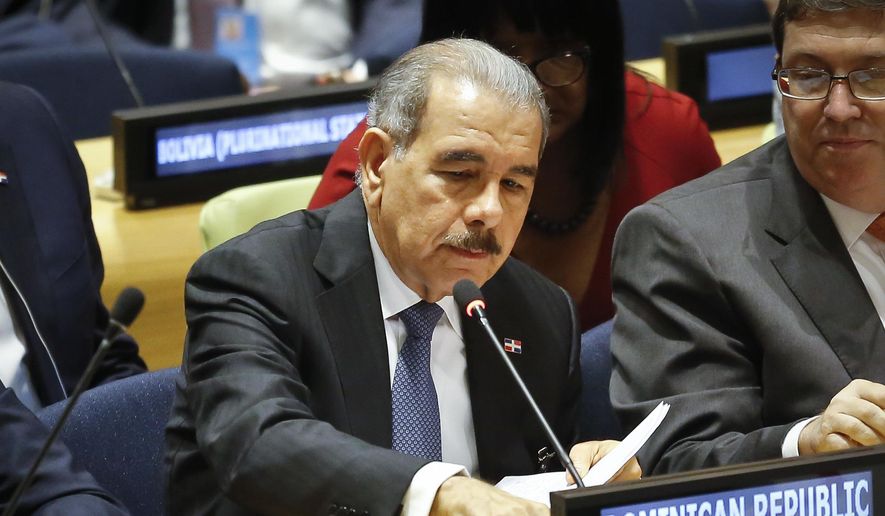China is expanding its influence in Latin America — most recently with a push to pump loans and investment into the Dominican Republic — but the impact might be felt hardest back in East Asia, where the self-ruled island of Taiwan says its facing blowback from Beijing’s moves.
Taiwanese Foreign Minister Joseph Wu claimed Tuesday that Beijing dangled a $3.1 billion development package to the Dominican Republic to get the Latin American nation to cut diplomatic ties with Taiwan, which is battling to maintain pro-U.S. economic independence amid China’s rise.
Dominican President Danilo Medina has “has ignored our long-term partnership, the wishes of the people of the Dominican Republic, and the years of development assistance provided by Taiwan, to accept false promises of investment and aid by China,” said Mr. Wu, according to wire reports.
The development comes roughly a year a similar Chinese loan and investment push convinced another Latin American nation, Panama, to also sever ties with Taiwan, which communist China considers a Chinese territory despite the fact that the island is a democracy recognized as a sovereign nation by more than a dozen countries.
While the United States technically does not recognize Taiwanese sovereignty from China, Washington does have a special relationship with the island and laws in place that require the United States to protect Taiwan from Chinese aggression.
President Trump made global headlines shortly after being elected in late-2016 when he phoned Taiwanese President Tsai Ing-wen in an expression of U.S. support for Taiwan. The call rankled officials in Beijing and analysts described it as a strategic move by the then-incoming U.S. president to set a more aggressive tone in U.S.-China diplomacy.
With that as a backdrop, Beijing claims its offers of loans and investments to Panama, the Dominican Republic and a host of other nations are not tied to any pre-condition that the countries must cut ties with Taiwan. However, Chinese authorities have made no secret over the years of their desire to delegitimize Taiwan’s push to be recognized as an independent nation.
Beijing has been seeking to increase pressure on Taiwan’s independence-leaning Ms. Tsai. The Taiwanese president’s ruling Democratic Progressive Party says it wants stable relations with China, but it hasn’t followed Ms. Tsai’s predecessor, Ma Ying-jeou, in endorsing the “one China” principle.
After Panama cut its ties with Taiwan last year, meanwhile, then-Taiwanese Foreign Minister David Tawei Lee visited the Dominican Republic as part of a campaign to shore up its relations and propose new cooperation projects.
During his stay in Santo Domingo, Mr. Lee met with Taiwan’s ambassadors in Latin America to discuss strategies for not losing more allies.
The Dominican Republic has received millions of dollars in donations for development programs from Taiwan, but the government also started commercial and political contacts with China beginning in the middle of the past decade.
According to the Dominican government, bilateral trade with China has reached $2 billion a year, making the Dominican Republic the second largest trading partner for China among the Caribbean and Central American nations.
The Dominican Republic announced it was cutting ties with Taiwan on Monday night. It was already Tuesday when the new broke in China. Chinese State Councilor Wang Yi and Dominican Foreign Minister Miguel Vargas held a brief event Tuesday morning marking the new ties between the two.
In a joint statement, the countries said the move was “in keeping with the interests and desire of the two peoples” and that the Dominican Republic will sever ties with rival Taiwan as a result.
“The Government of the Dominican Republic recognizes that there is but one China in the world, that the Government of the People’s Republic of China is the sole legal government representing the whole of China, and that Taiwan is an inalienable part of China’s territory,” the statement said.
Taiwan split from mainland China amid civil in 1949, and Beijing campaigns relentlessly to isolate the island globally. It cut off relations with Ms. Tsai’s government shortly after she took office in 2016 and has been steadily ratcheting up both diplomatic and economic pressure. Chinese analysts say Beijing will likely continue to use its economic and political clout to lure away other Taiwanese allies until Ms. Tsai accedes to China’s demands.
• This article is based in part on wire service reports.
• Guy Taylor can be reached at gtaylor@washingtontimes.com.




Please read our comment policy before commenting.